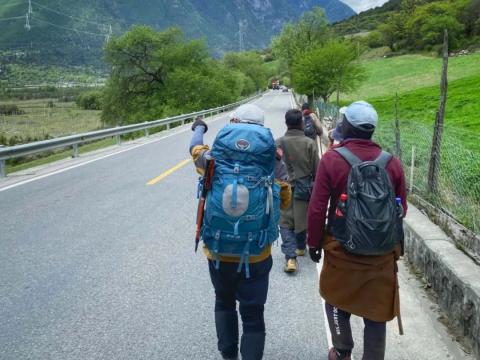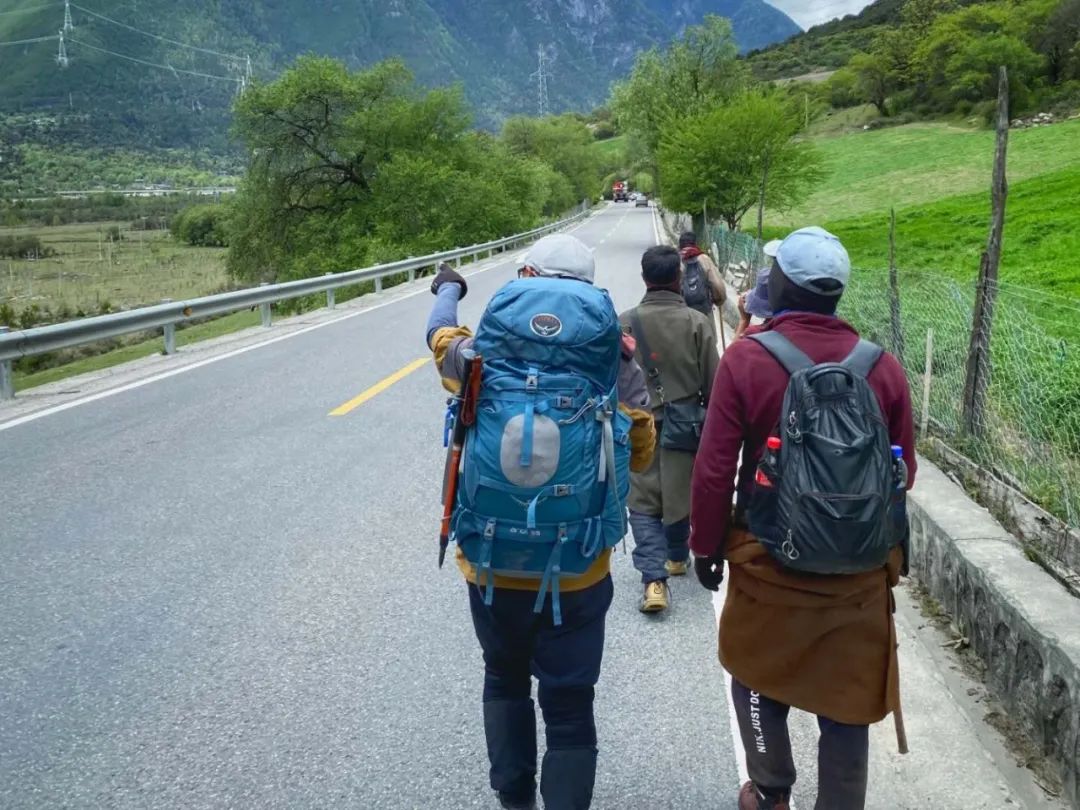
2021.05.08
Today’s destination is Guxiang. The total journey is 33 kilometers. It is another interesting day.
I just walked out of the county town in the morning and met a Tibetan family walking to Lhasa near a gas station. We shamelessly said we would go with them today, and they didn’t refuse, so the interesting story began.
There are four people in their family. The youngest boy is named Tashi Redan, and his parents. The eldest is his uncle (father's brother). Redan spoke the best Chinese, so I walked with him all the way.

Walking with Tashi Redan
Redan said that they came from Ruoergai County, Aba Prefecture, Sichuan. They walked from National Highway 317 to Qamdo and then changed south to 318. They walked here for more than 40 days and spent an average of about 50 yuan per person per day, mainly on food. I usually stay in a tent at night. I only stay in an inn when my power bank is out of battery and needs to be charged, or when the weather is very bad.
I saw Redan’s uncle walking at the front and Redan at the back. I asked him: When you walk, do you pay attention to this order? Do you have to go last?
Redan smiled and said no, it was because he couldn't walk and walked the slowest, so he always walked at the back🤣.
The best walker in the family is his uncle. He goes to the town to perform prayers every day, once in the morning, noon and once in the evening. He goes to perform prayers whenever he has nothing to do. In their town, he is considered a very good walker.
Redan said that he had been to Lhasa once when he was 16 years old, and his parents had been there twice, but this was the first time their family had walked to Lhasa.
Redan said that walking to Lhasa was the wish of his parents, and this time it finally came true.

Redan’s parents
They can't take a car when they walk to Lhasa. When they feel unwell, they can walk more slowly or take a few days of rest, but they can't take a car.
This also requires a lot of courage and perseverance. I think this may be the source of the faith of the pure disciples.
At noon, Redan’s father invited us to have dinner together. I happened to see a house on the roadside. Redan's father stood on tiptoe from outside the courtyard wall and spoke to the people in the courtyard. He spoke in Tibetan at first. After saying a few words, I felt that the people inside didn’t understand, so I said in Chinese: Boil water.
After a while, the door to the yard opened, and an old woman handed a boiling water bottle through the crack in the door.
In fact, this family is also a Tibetan. When Redan speaks Tibetan, it depends on the place. Just like our Han dialect, they can’t understand the Tibetan spoken by the people here 😂
Redan handed me a new wooden bowl he bought yesterday and asked me to guess how much this bowl costs. I said 30 yuan.
He said that the bowl was sold for 150 yuan, and he told the boss that he was going to Lhasa on foot, and finally sold it to him for 100 yuan.
After getting boiling water, Redan’s father started to teach me how to make tsampa. First put a little ghee in the bowl, and then pour some boiling water (actually salty tea) into the bowl to melt the ghee.
I saw Redan's father drinking water from the bowl. I asked them, "Take a sip of water first. Is there any particular procedure for this?"
Redan laughed again, he said it was because he poured too much water and he had to drink some of it😅
The next step is to put the highland barley fried noodles and milk residue (the leftovers from making ghee) into the bowl, then mix them evenly with your hands, and you can eat.
This is my first time making tsampa, and also my first time eating tsampa. The clumsy way I mixed the flour made the whole family laugh at me.

Learn to knead tsampa
Finally, I mixed the bowl of tsampa evenly and pinched one for Brother Han. The silly dog didn't want it, he only tasted a little bit, and the rest of the big bowl was mine.
I couldn't eat any more after eating two. This thing tasted really solid, even more solid than compressed biscuits, so I left more than half a bowl.
Redan also saw that I didn't want to eat, so he said, "Give me the rest." So he took my bowl and ate most of the remaining bowl.

Eat tsampa
Today Redan answered a question that has puzzled me for several days.
Recently, you will see several packages placed on the roadside. The outside of these packages is fixed with two arched branches and bandages. The contents inside are usually made of woven bags, plastic sheets or some waterproof fabrics. Wrapped up, there is a simple strap on the outside.

The package I saw before
Redan said that this kind of package was the luggage of their Tibetan people, which contained things such as sleeping blankets, mats, and tents.
Every morning, they would stop cars on the road. Generally speaking, Tibetans who drove saw them carrying luggage and stopped cars, so they understood that they wanted to help check in their luggage. They will leave their phone number with the driver and ask the driver to help put the luggage about 40 kilometers ahead.
Drivers usually place their luggage in a more conspicuous place on the roadside, or in a place with obvious landmarks. After placing it, I will give them a call to describe the specific location of the package.
Then for the next day, the Tibetans on foot began to look for their packages on the roadside, and after finding them, they rested nearby.
Today Redan's package was placed "near the container by Guxiang Lake" by the driver.
Redan said that one time the driver did not look at the map and left their package 70 to 80 kilometers away. They couldn't walk any further, so they had to stay in an inn that day.
Their tent was broken when it was dropped from a large truck after being transported there, so now they can only sleep in the open air.
When we were approaching Guxiang Lake, Redan found a shortcut that would save us a detour. Just when he was about to ask his family to take the shortcut together, Silly Gou said: What if I miss your package by taking the shortcut? Redan thought for a while and finally decided not to take a shortcut.
Sure enough, after walking not far, they saw their package. Not near a container, but near a container truck 😂 It seems that there are also communication barriers in Tibetan dialects.

find package

Tie the carry-on bag to the package

Put the package on your back and keep walking
After finding the package, Redan and his family followed us to the hotel we booked today, Guxiang Lake Manor.
At this time, a light rain began to fall in the sky. After Redan communicated with the boss, the family lived under the pavilion in the yard, just in time to take shelter from the rain.
In the evening, after Redan took the power bank to our room to charge, today’s story ends here.
We went down there and confounded their accents so that their speech would be incomprehensible to each other. ” (Genesis 11:7)
Today's day with Redan went by very quickly, and the 33-kilometer journey was completed without any feeling.
Redan has a very cheerful personality and is willing to share a lot of Tibetan culture with me. He is also full of curiosity about things he doesn’t understand. Although he lives in a pastoral area and makes a living by herding cattle, apart from the differences in language and lifestyle, from a human perspective, there is actually no difference between us.
But it is precisely because of some differences that the world is so colorful and full of charm.
The light of Jesus shines on Guxiang Lake in the evening
▪Swipe left or right to see more▪
DAY43: Bomi County-Guxiang
Altitude changes:
2724-2646
Transportation:
Hiking 33 kilometers
Accommodation recommendations:
Guxiang Lake Manor
Dining locally:
"Breakfast" soy milk and fried dough sticks Mayuan
"Lunch" road meal - tsampa, pot helmet
"Late" stir-fried rice
Generate garbage:
Cigarette butts*3, pure water bottle*1, candy wrappers*2




